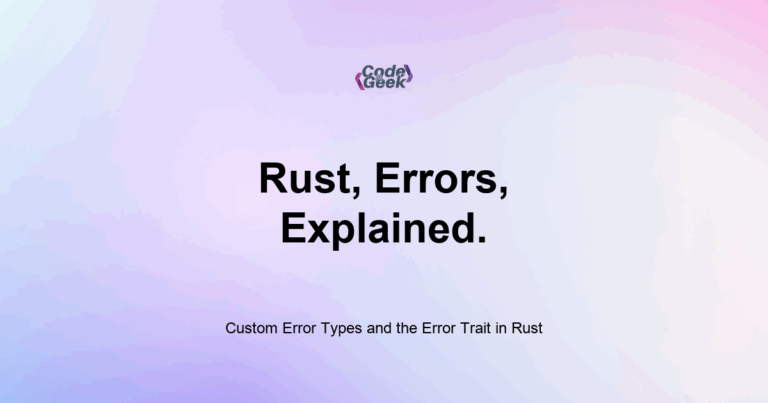New to Rust? Grab our free Rust for Beginners eBook Get it free →
Custom Error Types and the Error Trait in Rust

Rust encourages explicit error handling using custom error types. You can create your own error enums and implement the standard Error trait to integrate cleanly with Rust’s built-in error handling ecosystem. This helps produce descriptive, meaningful errors that are easy to handle and debug.
When I first moved beyond using Rust’s built-in errors, I needed a clear way to represent application-specific failures. That’s when I started defining my own error types using Rust’s powerful enum system. Combined with the Error trait, custom errors let me create readable, manageable, and maintainable error-handling logic, improving my application’s clarity and robustness.
In this article, you will learn how to create custom error types, implement Rust’s built-in Error trait, use the thiserror crate for simpler definitions, and understand why custom errors are better than generic strings or panics.
Why Use Custom Error Types?
Using custom errors instead of generic messages or panics has multiple advantages:
- Clarity: Clearly describe what went wrong.
- Type Safety: Use enums to handle errors reliably.
- Integration: Works seamlessly with Result and Rust’s standard libraries.
A custom error helps callers understand exactly what went wrong and how to fix or handle it.
Creating a Custom Error Enum
Start by defining an enum to represent different errors in your application:
#[derive(Debug)]
enum FileError {
NotFound,
PermissionDenied,
InvalidData(String),
}
This simple enum clearly shows the possible error conditions:
- NotFound: file is missing.
- PermissionDenied: insufficient permissions.
- InvalidData: file content is invalid, carrying a message.
Implementing Display for Custom Errors
Implementing the std::fmt:display trait lets you format your errors into user-friendly messages:
use std::fmt;
impl fmt::display for FileError {
fn fmt(&self, f: &mut fmt::Formatter) -> fmt::Result {
match self {
FileError::NotFound => write!(f, "File not found"),
FileError::PermissionDenied => write!(f, "Permission denied"),
FileError::InvalidData(msg) => write!(f, "Invalid data: {}", msg),
}
}
}
Now your error messages are clear and readable.
Implementing the Error Trait
To integrate fully with Rust’s ecosystem, implement the std::error::Error trait:
impl std::error::Error for FileError {}
The Error trait allows your custom error to be used with popular Rust libraries and standard error-handling patterns.
Using Custom Errors with Result
You can now use your custom error in functions returning Result:
fn read_config(file_path: &str) -> Result<String, FileError> {
if file_path == "missing.txt" {
Err(FileError::NotFound)
} else if file_path == "protected.txt" {
Err(FileError::PermissionDenied)
} else if file_path == "invalid.txt" {
Err(FileError::InvalidData("Corrupted format".into()))
} else {
Ok("Configuration loaded successfully".into())
}
}
Callers of your function can match errors explicitly:
match read_config("invalid.txt") {
Ok(content) => println!("Config loaded: {}", content),
Err(e) => println!("Failed: {}", e),
}
Using the thiserror Crate
The thiserror crate simplifies defining custom errors significantly. Add it to your Cargo.toml:
thiserror = "1.0"
Then, redefine your error like this:
use thiserror::Error;
#[derive(Debug, Error)]
enum FileError {
#[error("File not found")]
NotFound,
#[error("Permission denied")]
PermissionDenied,
#[error("Invalid data: {0}")]
InvalidData(String),
}
The thiserror crate automatically generates implementations for Display and Error, making your code shorter and cleaner.
Propagating Errors with the ? Operator
The ? operator makes error propagation concise and readable:
fn load_and_parse(file_path: &str) -> Result<u32, FileError> {
let content = read_config(file_path)?;
content.parse::<u32>().map_err(|_| FileError::InvalidData("Not a number".into()))
}
This pattern keeps your functions clean by handling errors transparently.
Custom Errors vs Generic Errors
Using a generic String for errors might seem simpler, but you lose clarity:
- Generic: difficult to handle specific cases.
- Custom Enum: explicit and type-safe handling of different errors.
With custom errors, you make your intentions clear and your code robust.
Custom Errors vs Panic
Rust also provides panic! for unrecoverable errors. However:
- Use panic only if recovery is impossible.
- Use custom errors for recoverable, predictable failures.
This approach is safer, clearer, and Rust idiomatic.
Summary
Custom errors are an essential part of idiomatic Rust. They clarify failure scenarios, integrate naturally with Rust’s error-handling system, and enhance your code’s maintainability. Whether you manually implement the Error trait or use a helper like thiserror, defining clear, specific error types will dramatically improve your Rust applications.
Rust Intermediate Concepts
- Generic Types in Functions and Structs
- Implementing Traits for Custom Behavior in Rust
- Trait Bounds and Constraints in Rust
- Lifetimes in Rust
- Using Closures (Anonymous Functions) in Rust
- The Iterator Trait and .next() in Rust
- Higher Order Iterator Methods: map, filter, and fold in Rust
- Using impl Trait for Simplicity in Rust
- Advanced Collections: HashSet and BTreeMap in Rust
- Custom Error Types and the Error Trait in Rust
- Option and Result Combinators in Rust
- Writing Unit Tests in Rust
- Integration Testing in Rust
- Logging in Rust with the log Crate
- Cargo Tips and Tricks for Rust Projects
- CLI Argument Parsing with Clap in Rust
- File I/O and File System Operations in Rust
- Running External Commands in Rust
- Make HTTP Requests in Rust with Reqwest
- JSON Serialization and Deserialization in Rust with Serde
- Building a Weather CLI in Rust
- Date and Time Handling in Rust with Chrono
- Using Regular Expressions in Rust with the regex Crate
- Memory Management in Rust
- Understanding Borrow Checker Errors in Rust
- Interacting with Databases in Rust
- Building a Todo List CLI in Rust with SQLite
- Concurrency in Rust




